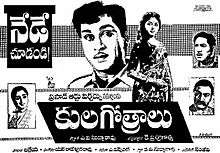Kula Gotralu
| Kula Gotralu | |
|---|---|
 Theatrical release poster | |
| Directed by | K. Pratyagatma |
| Produced by | A. V. Subba Rao |
| Written by | Acharya Aatreya (dialogues) |
| Screenplay by | K. Pratyagatma |
| Story by | K. Pratyagatma |
| Starring |
Akkineni Nageshwara Rao Krishna Kumari |
| Music by | S. Rajeswara Rao |
| Cinematography | A. Vincent |
| Edited by | A. Sanjeevi |
Production company | |
| Distributed by | Navayuga Films |
Release date |
|
Running time | 158 mins |
| Country | India |
| Language | Telugu |
Kula Gotralu (Telugu: కులగోత్రాలు; English: Caste & Clans) is a 1962 Telugu, drama film, produced by A. V. Subba Rao on Prasad Art Pictures banner and directed by K. Pratyagatma. Starring Akkineni Nageshwara Rao, Krishna Kumari in the lead roles and music composed by S. Rajeswara Rao. The film won the National Film Award for Best Feature Film in Telugu certificate of merit in 1963.[1] The Telugu veteran actor Krishna played a sidekick role in the movie before entering into the industry.
Plot
Ravi (Akkineni Nageswara Rao), son of Zanindar Bhushaiah (Gummadi), is studying at Visakhapatnam. He loves his classmate Saroja (Krishna Kumari). Saroja's mother Kanthamma (G. Varalakshmi) is cheated by Chalapati (Mikkilineni). Bhushaiah values sentimental about caste and clan and consequently does not accept Ravi's love for Saroja. So he leaves the house and marries Saroja in a temple. Ravi is posted as a Police Inspector in the village only. Because of his father, he even not able attend his sister Leela's (Girija) marriage. Due to that, his mother Shanthamma (Nirmalamma) dies of mental illness, which brings about a change in Bhushaiah. After that Ravi has a son, who attracts Bhushaiah to visit him secretly and even gifts him a gold chain. Chalapati attempts to rob the house of Bhushaiah and get caught by Ravi. At the end, Bhushaiah leaves his casteism and invites his son, daughter-in-law, and grandson to his house.
Cast
- Akkineni Nageswara Rao as Ravi
- Krishna Kumari as Saroja
- Gummadi as Bhushaiah
- Relangi as Sadanandam
- Ramana Reddy as Ramanayya
- Padmanabham as J. J. Rao / Jasthi Joga Rao
- Allu Ramalingaiah as Peeramma
- RajaBabu as Ravi's friend
- Mikkilineni as Chalapati
- Krishna as Brideroom in marriage
- Suryakantam as Jagadamba
- G. Varalakshmi as Kanthamma
- Girija as Leela
- Sandhya as Anasuya
- Nirmalamma as Shanthamma
Crew
- Art: G.V.Subba Rao
- Choreography: Heeralal
- Dialogues: Acharya Aatreya
- Lyrics: Dasaradhi, C. Narayana Reddy Sri Sri, Kosaraju
- Playback: Ghantasala, P. Susheela, Swarnalatha, P. B. Srinivas, Madhavapeddi Satyam,
- Assistant Director: Tatineni Rama Rao
- Music: Saluri Rajeswara Rao
- Editing: A. Sanjeevi
- Cinematography: A. Vincent
- Producer: A. V. Subba Rao
- Story - Screenplay - Director: K. Pratyagatma
- Banner: Prasad Art Productions
- Release Date: 27 August 1962
Soundtrack
| Kula Gotralu | |
|---|---|
| Film score by Saluri Rajeswara Rao | |
| Released | 1962 |
| Genre | Soundtrack |
| Length | 40:00 |
| Producer | Saluri Rajeswara Rao |
Music composed by Saluri Rajeswara Rao. The comic song "Ayyayo Chetilo Dabbulu Poyene" by Madhavapeddi Satyam on playing cards and its sequels was very popular. Music released on Audio Company.[2][3]
| S.No | Song Title | Lyrics | Singers | length |
|---|---|---|---|---|
| 1 | Chelikadu Ninne Rammani Piluvaa | C. Narayana Reddy | Ghantasala, P. Susheela | 5:00 |
| 2 | Chilipi Kanula Thiyyani Chelikadaa | C. Narayana Reddy | Ghantasala,P Suseela | 5:00 |
| 3 | Ayyayyo Chethilo Dabbulo Poyane | Kosaraju | Madhavapeddi Satyam, Pithapuram | 5:00 |
| 4 | Maama Sathru Bhayankara (Padyalu) | Kosaraju | Madhavapeddi,Relangi | 5:04 |
| 5 | Nee Nallani Jadalo Poolu | Kosaraju | Jamuna Rani,Pitapuram | 4:56 |
| 6 | Raave Raave Balaa | Kosaraju | PB Sreenivas,Jamuna Rani | 5:00 |
| 7 | Ravayya Maa Intiki | Kosaraju | Ghantasala,P Susheela | 6:06 |
| 8 | Sakhi Sakuntala Rekkalu Dharinchi | Sri Sri | Ghantasala,P Susheela,Swarnalatha | 5:00 |
Trivia
It is the first film to be shot at Visakhapatnam.[4] It is subsequently followed by Maro Charitra (1978), Driver Ramudu (1979) and many more.
Awards
References
- ↑ "Directorate of Film Festival" (PDF). iffi.nic.in.
- ↑ "Kula Gothralu (1962) Songs". telugulyrics.org.
- ↑ Kula Gothralu Movie Songs - Nee Nallani Jadalo Song - ANR, Krishna Kumari, Krishna. 26 July 2014 – via YouTube.
- ↑ "Vizag's contribution to films". The Hindu.
- ↑ "10th National Film Awards". International Film Festival of India. Retrieved 9 September 2011.
External links
- Kula Gotralu on IMDb